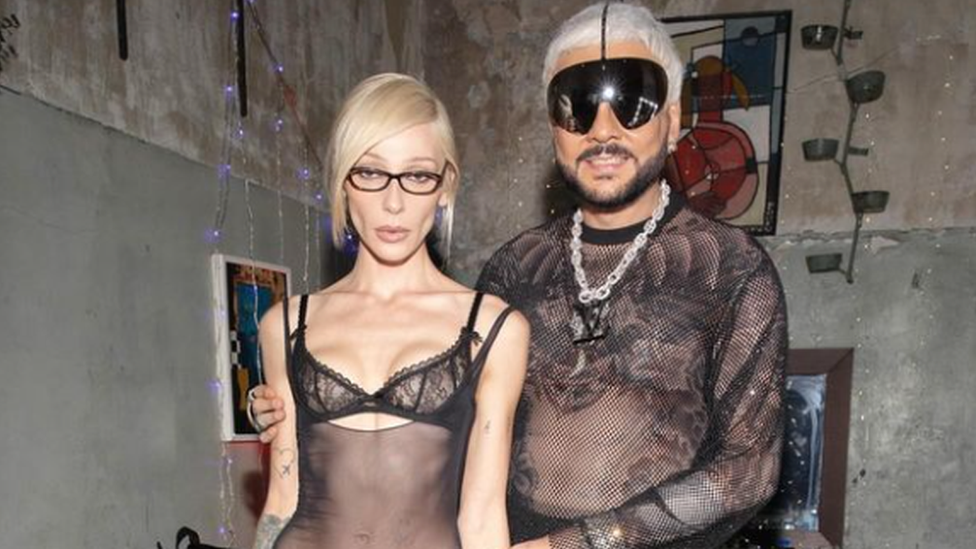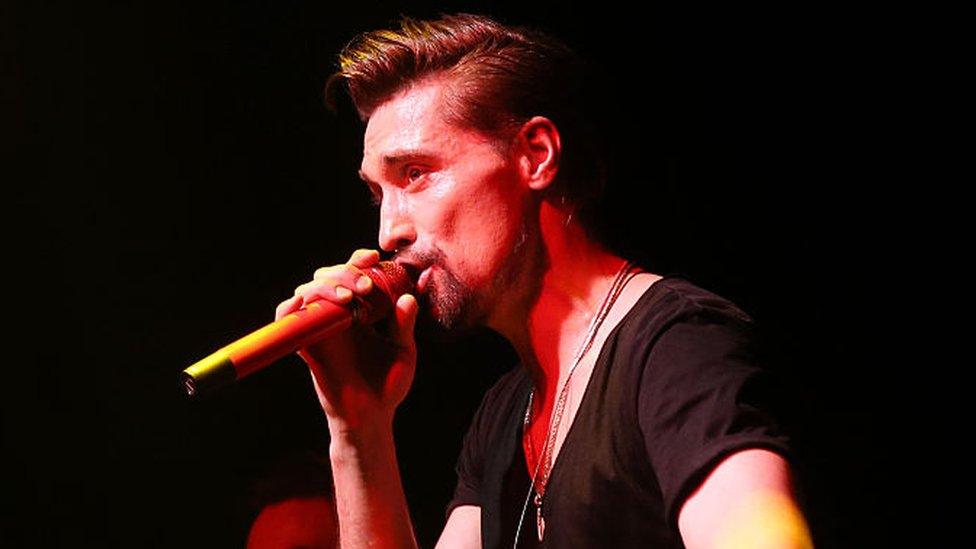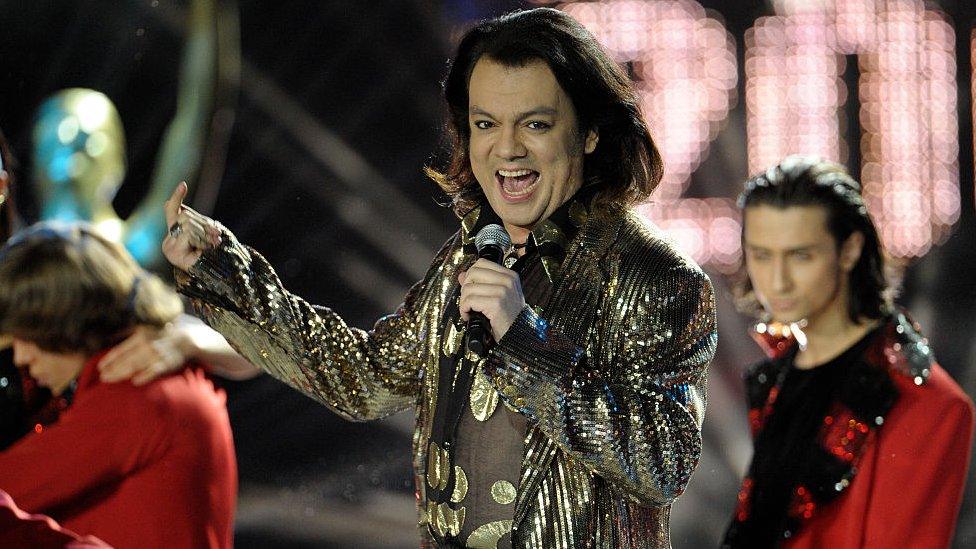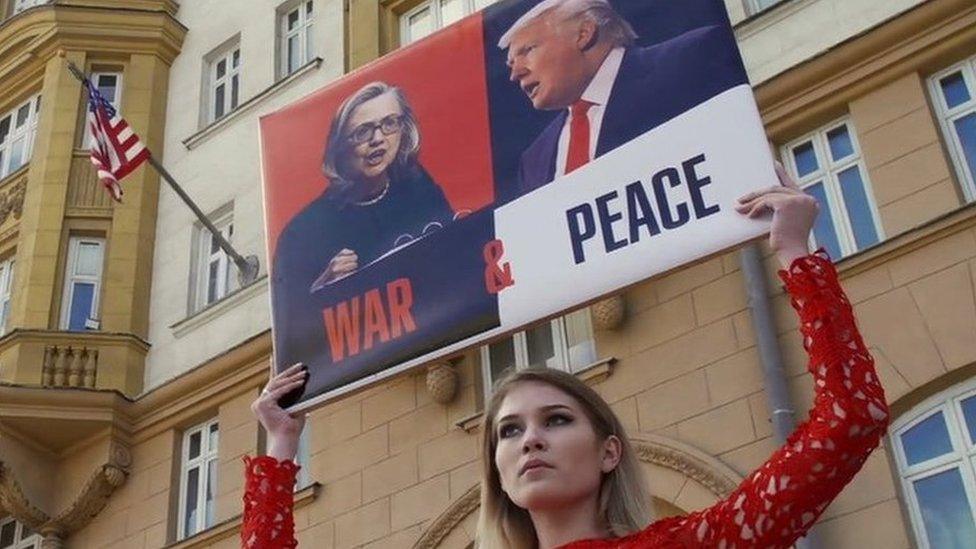Russian celebs at 'almost naked' party stung by backlash
- Published

Nastya Ivleeva who threw the party was pictured at Moscow's Mutabor nightclub with singer Philipp Kirkorov
This is Partygate: Russia-style.
What happened at a Moscow nightclub was bizarre. What happened next says so much about the current atmosphere in Russia.
On 20 December, blogger and TV presenter Nastya Ivleeva threw an "Almost Naked Party" at Moscow's Mutabor nightclub.
Dress code? More like an undress code.
Scantily clad pop stars and celebrities attended the soiree. Including Russian rapper Vacio [real name Nikolai Vasiliev]. He turned up wearing only training shoes and one strategically placed sock.
It was a private party. But it became very public when videos and photos appeared on social media. Overnight, Vacio's became the most famous sock in Russia. And not in a good way.
There was uproar. Pro-Kremlin bloggers, MPs and activists, who support the war in Ukraine, were furious: how could celebrities be out partying like this while Russian soldiers were putting their lives on the line in the "special military operation"?
For the revellers, the party was well and truly over. Rapper Vacio was arrested and jailed for 15 days for "disorderly conduct". He was also fined 200,000 roubles (£1,700; $2,200) for "promoting non-traditional sexual relations".
The organiser of the "Almost Naked Party", Nastya Ivleeva, is facing legal action. More than 20 people have signed a class-action lawsuit. They're demanding she pay a billion roubles (£8.5m) to the Defender of the Fatherland Foundation, an organisation that donates money to participants of the Kremlin's "special operation".
Other partygoers are facing the music, too.

Russian Eurovision veteran Dima Bilan insisted he was fully clothed and had no idea what other guests would wear
There's talk of concert dates being cancelled and advertising contracts terminated. Reports, too, that some of the stars are being edited out of pre-recorded New Year's Eve entertainment shows on Russian TV.
Big names - suddenly cancelled.
Cue the video messages.
One by one, the prominent party guests have been taking to social media - some to apologise for their attendance, others to insist they've done nothing wrong.
"I recognise I made a mistake," declared the now fully dressed megastar Philipp Kirkorov. "The last thing I want is for such an event, my mistake, to result in restrictions on my career in Russia, the only country I exist in as an artist and as a citizen."
"I wore a polo-neck, a big trench coat, trousers and shoes," said pop star Dima Bilan. "I couldn't know in advance what the other guests would be wearing."

Until now, Philipp Kirkorov has been a staple of Russia's pre-recorded New Year's Eve TV schedule
"Тhey say that Russia knows how to forgive. If so, I would like to ask you, the people, for a second chance," said Nastya Ivleeva in her video message.
"If the answer is no, then I'm ready for my public execution. I won't shy away. I'm ready for any outcome."
Events of the last few days will have come as a shock to these celebrities.
Following the Kremlin's full-scale invasion of Ukraine, they had taken the conscious decision to remain in Russia and continue their careers, and often lavish lifestyles, here. Public criticism was reserved for those anti-war celebs who had left Russia.
Not any more. But why?
It seems to me that Russia's political system, increasingly, relies on scapegoats. It needs groups or individuals it can point to and blame for problems at home and abroad.
Up till now, those scapegoats have included Ukraine, the US, the UK, the EU and Nato.
Now, it seems, some Russian celebrities are on the list.
In a social media post, this is how exiled Russian opposition activist Maxim Katz summed up events: "In the past, there was a simple social contract with people who went to parties like this: do whatever you want as long as you stay loyal.
"But life is no party now. These ostentatious displays contrast with reality outside. You can't flippantly party in a country waging war.
"For the first time in a long time, the system has pushed back against those who supported all its rules, as long as they weren't applied to them."
Related topics
- Published7 September 2016

- Published15 December 2023
